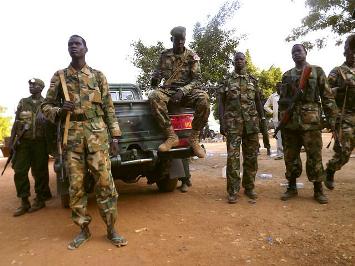Khartoum and Juba sign non-aggression pact
February 10, 2012 (KHARTOUM) – The governments of Sudan and South Sudan have signed a non-aggression treaty in the Ethiopian capital that is hoped to de-escalate growing tensions between the neighbouring states.

“In the event that there are complaints or allegations from either side… then they should be appointed to the joint mechanism,” Mbeki told reporters according to Agence France Presse (AFP).
The deal was signed by the head of South Sudan’s intelligence bureau, Thomas Douth, and Sudan’s director of National Intelligence and Security Services (NISS) Mohammed Atta.
In recent weeks the leaders in Khartoum and Juba have exchanged warnings of possible outbreak of war particularly as the long standing dispute over oil
showed no sign of easing.
Last month, South Sudan suspended its oil production in retaliation to a decision by Khartoum to seize part of its crude exported through the north’s pipelines to satisfy what it claims to be financial arrears.
On top of that, the two countries accuse each other of supporting rebel groups fighting their respective governments.
In particular Khartoum lodged complaints with the United Nations Security Council (UNSC) detailing support it claims Juba gives to the Sudan People’s Liberation Movement North (SPLM-N) fighting the Sudanese army in the border states of Blue Nile and South Kordofan.
There have been several reports of aerial bombardments by Sudan Armed Forces (SAF) inside the borders of South Sudan in the last few months.
According to the pact, the two sides agreed to “respect for each other’s sovereignty and territorial integrity” and to “refrain from launching any attack, including bombardment”.
Mbeki urged both sides to ensure Friday’s peace deal is adhered to.
“We are very serious… it is the responsibility of both sides to act now,” he said.
It remains to be seen whether the agreement will produce any change on the ground or tone down rhetoric from officials in the two countries.
Since its inception in October 2009, the AUHIP has worked tirelessly to help Khartoum and Juba sort out their post-secession contentious issues such as oil, borders, Abyei, national debt and citizenship.
But so far little progress has been made on resolving these items. Last June, the Sudanese President Omer Hassan al-Bashir even scrapped an AUHIP brokered framework agreement his assistant signed relating to the conflict in South Kordofan.
Furthermore, another accord on Abyei crafted by Mbeki’s panel faced difficulties in implementation after Khartoum later attached conditions to fully withdrawing its troops from the disputed region.
In New York, the United Nations Secretary General Ban Ki-moon warned Friday that tensions between the two nations could escalate if outstanding issues are not resolved, urging peace and reaching agreements on all issues.
“The moment has come for the leaders of both countries to make the necessary compromises… that will guarantee a peaceful and prosperous future for both nations,” he said in a statement.
(ST)
